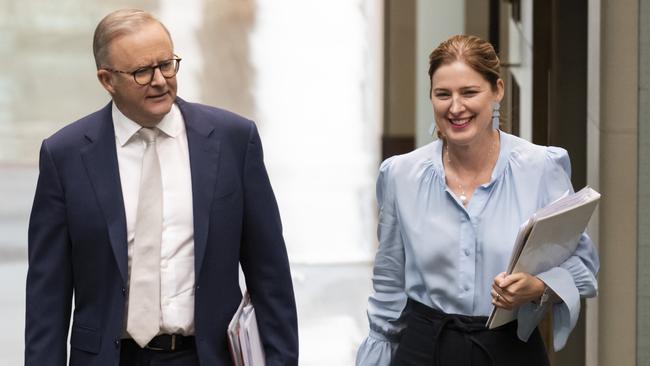Small business profit crunch amid record insolvencies surge
Company insolvencies have hit record highs with more than 6600 firms faltering in the six months to September, fuelling warnings small businesses are struggling to stay afloat.

Company insolvencies have hit record highs with more than 6600 firms faltering in the six-months to September, fuelling warnings small businesses are struggling to stay afloat amid high inflation and interest rates, increasingly complex regulations and cyber attacks.
Australian insolvency statistics published by ASIC reveal company insolvencies capturing firms entering external administration for the first time hit 11,053 in 2023-24, swelling overall insolvencies since the 2022 election to 22,800.
The corporate regulator listed 3305 insolvencies in the June quarter and 3331 in the September quarter, which the Coalition says represents the worst six-month period on record and bakes-in the highest average of business insolvencies of any parliamentary term at “2481 insolvencies per quarter”.
The hardest hit industries have been construction, accommodation and food services, retail trade, professional, scientific and technical services and manufacturing. Amid wafer-thin economic growth, flatlining productivity and investment concerns raised by big business, NSW, Victoria and Queensland recorded the highest number of insolvencies.
The spike in insolvencies come as the Council of Small Business Organisations Australia and Commonwealth Bank release a report warning of new industrial relations regimes, spiralling energy, rent, interest rates and insurance costs, critical workforce shortages, energy transition delays and cyber security vulnerabilities.
The inaugural Small Business Perspective Report launched in parliament on Wednesday says “operating conditions are arguably the most challenging in living memory”, with twin challenges of increasing living and business expenses “impacting the wellbeing of 2.5 million small business owners”.
The report shows 57 per cent of small business owners reporting high stress due to financial strain, with one-in-three not paying themselves due to cash flow issues and 25 per cent using personal savings to keep afloat.
Surging operating costs have crunched profit margins with 46 per cent of businesses experiencing increased expenses. The report says almost 50 per cent of small businesses have yet to embark on their green transition, and raises concerns that nearly half of all cyber attacks are targeting small businesses.
COSBOA chief executive Luke Achterstraat said monthly insolvencies across the construction, hospitality and retail sectors are at their highest levels in almost a decade, with small businesses tipping dangerously close to insolvency.
“When a small business isn’t breaking even, the last person to get paid is the owners themselves, and that means the cost of doing business crisis compounds the cost-of-living crisis for small business owners and their families,” Mr Achterstraat said.
Small Business Minister Julie Collins said “Labor is the party of small business”, with the government providing more than $640m in “practical and targeted support” including programs shielding employers from cyber attacks.
“We are extending the $20,000 instant asset write-off, making it easier for small businesses to invest and grow. We are providing further targeted energy bill relief of $325 to around 1 million eligible small businesses through the Energy Bill Relief Fund,” Ms Collins said.
Deputy Opposition Leader Sussan Ley said the ASIC data “confirms Anthony Albanese is on track to be the worst Prime Minister this century for business insolvencies”.
The opposition small business spokeswoman said the insolvency spikes are “damning”.
“This isn’t just data, it is real businesses going bust, real jobs disappearing and real Australians who are hurting. The Albanese government is on track to be the worst on record when it comes to businesses going to the wall,” Ms Ley said.
CBA small business banking executive general manager Rebecca Warren said “leading a small business today is tough, even if you’re successful”.
“Small businesses are facing into a difficult external environment posed by high inflation and interest rates as well as workforce challenges. Rising costs of goods, wages, and regulatory compliance continue to squeeze profit margins,” Ms Warren said.
“Access to capital remains a critical hurdle, with many female small business owners finding it difficult to secure funding for growth and development.”
With small businesses accounting for one-third of the nation’s GDP and employing more than 5 million Australians, Mr Achterstraat said “this report should be a wake-up call to policymakers and politicians”.
“If we do not create better policies to support the engine room of the economy, we will have less small business, reduced competition and be stuck with higher prices for longer.”
COSBOA deputy chair Wes Lambert said “it’s hard to find a way forward … keeping the business going and paying my staff keeps small business owners in our industry up at night”.
Master Builders Australia chief executive Denita Wawn said “it’s been a perfect storm: high inflation, rising interest rates, chronic labour shortages, industrial relations changes and high material costs.”




To join the conversation, please log in. Don't have an account? Register
Join the conversation, you are commenting as Logout